Elena Baltacha: The 'warrior' tennis star who fought severe illness
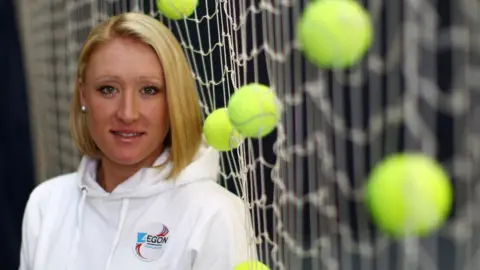 Getty Images
Getty ImagesWhen Elena Baltacha played tennis she was a "warrior" who fought a severe debilitating illness to become British number one, according to her former coach Nino Severino, the man she married just months before her death.
Severino says that watching a new feature-length documentary about her life has made him realise more than ever what an "incredible woman" she was.
He said she was an "unbelievable fighter" and would not let anyone know about the liver condition that made her life a "nightmare" because she did not want their pity.
Baltacha died in 2014 at the age of 30.
Renowned tennis coach Judy Murray was a lifelong friend who had known her since she turned up at a tournament in Dunblane when she was nine.
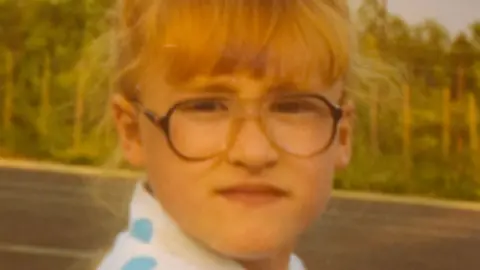 Baltacha family
Baltacha familyMurray, mother of tennis champions Andy and Jamie, recalls an incredibly confident young girl with ginger hair, a cap and big glasses.
"She won the tournament, her thumping serve meaning she lodged the balls in the hedge - upsetting her opponent in the process," she says. "It was an indicator of her natural strength. You know, little girls aged nine just do not serve like that."
Sport was in Baltacha's blood. Her mother Olga was an athlete and her father Sergei was an international footballer.
She was born in Ukraine and moved first to Ipswich and then to Scotland aged six when her father started to play for St Johnstone in Perth.
Her father tells the documentary: "We moved to Scotland and they started to change accent, especially Elena because she was young. She became a Scottish girl. Scotland became very important to Elena."
Baltacha began working with tennis coach Jimmy Mackechnie at Perth Tennis Club and by the time she met Judy Murray she was already an impressive player.
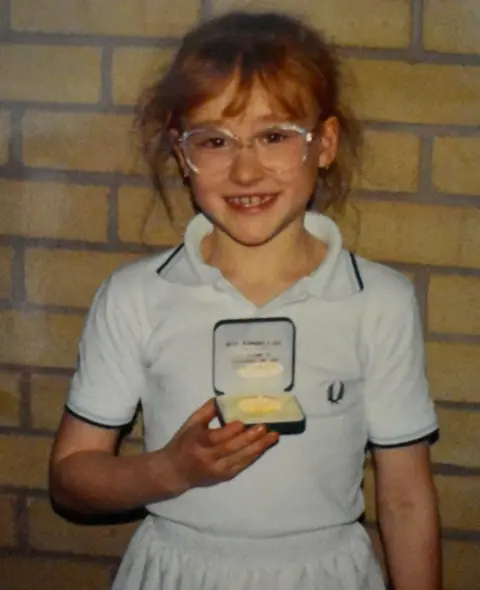 Baltacha family
Baltacha family
Her brother, also called Sergei, said he thought he was quite good at tennis but his younger sister was much better.
"I took tennis quite seriously myself, I thought I was quite good until I was 15/16 and my 12-year-old sister was starting to beat me and I was like 'nope, I'm not that good'," he says.
As a teenager, Baltacha moved to London to work with coach Alan Jones and former world No.5 Jo Durie.
She started to develop a reputation as a fierce player on the court.
According to Judy Murray: "She was just really generous of spirit and yet if you watched her playing tennis you would see a ferocious competitor that looked as tough as nails. It's almost like this split personality."
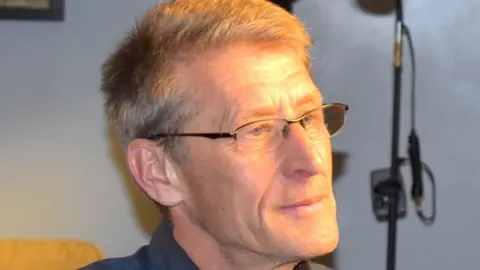 BBC Alba
BBC AlbaIn 2002, when she was 19, Baltacha reached the third round of Wimbledon and the Australian Open. Her career was taking off but she was struggling with illness.
She was eventually diagnosed with primary sclerosing cholangitis, a liver condition that caused extreme lethargy and fatigue.
Severino says it was a horrendous disease but Baltacha "fought like hell" to retain her place on the tennis world tour, training hard despite the extreme tiredness.
Her determination saw her make it into the top 50 ranking players in the world, beating three top 10 players. She was also a key Fed Cup player.
Fed Cup captain Judy Murray said: "If you want somebody to lead your team and you want somebody to be a great role model as a British No.1, both on and off the court, you would pick her every time."
It was Murray who broke the news to Baltacha that she had made Team GB for the 2012 Olympics in London, where she followed in the footsteps of her parents, who were both selected for the Olympics for the USSR.
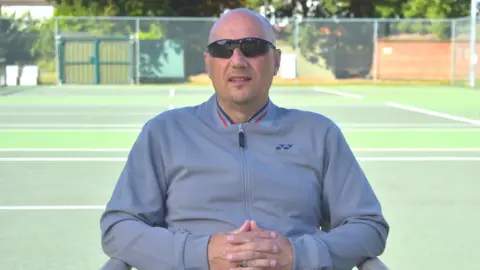 BBC Alba
BBC AlbaEventually, Baltacha's struggles with her health hastened her decision to to retire from tennis in 2013 and just a few weeks later she married Severino.
He tells the programme that Baltacha, who everyone in tennis called Bally, had been unwell in the run-up to the wedding.
"She wasn't feeling that well but we thought she had a virus because none of the medical people had picked it up," he says.
"But on the day of the wedding she was suffering quite a lot.
"The wedding was the best day our lives, it was something that Bally wanted so much, to be married. She arranged all the wedding and it was a fairytale for both of us. She was beautiful, absolutely beautiful."
Just a few weeks later, in January 2014, Elena was taken to hospital in severe pain. She was diagnosed with what they would soon learn was terminal cancer of the liver.
Baltacha flew to America in an attempt to save her life. Her husband, brother and parents all joined her there but her health was rapidly deteriorating.
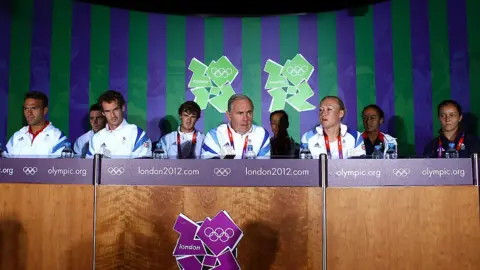 Getty Images
Getty ImagesElena Baltacha-Severino died on 14 May 2014 surrounded by her family. She was just 30 years old.
Her husband Nino said: "It was just the most mind-breaking experience really, a terrible end to an incredible life."
Five years on, Severino says the tennis academy that the pair set up in her name is her greatest legacy.
He says they try to teach the girls at the academy everything that Bally was.
"It's a beautiful thing because the documentary really made me feel even closer to what I know Bally wanted to do with the foundation and for girls to have a chance through sport," he says.
